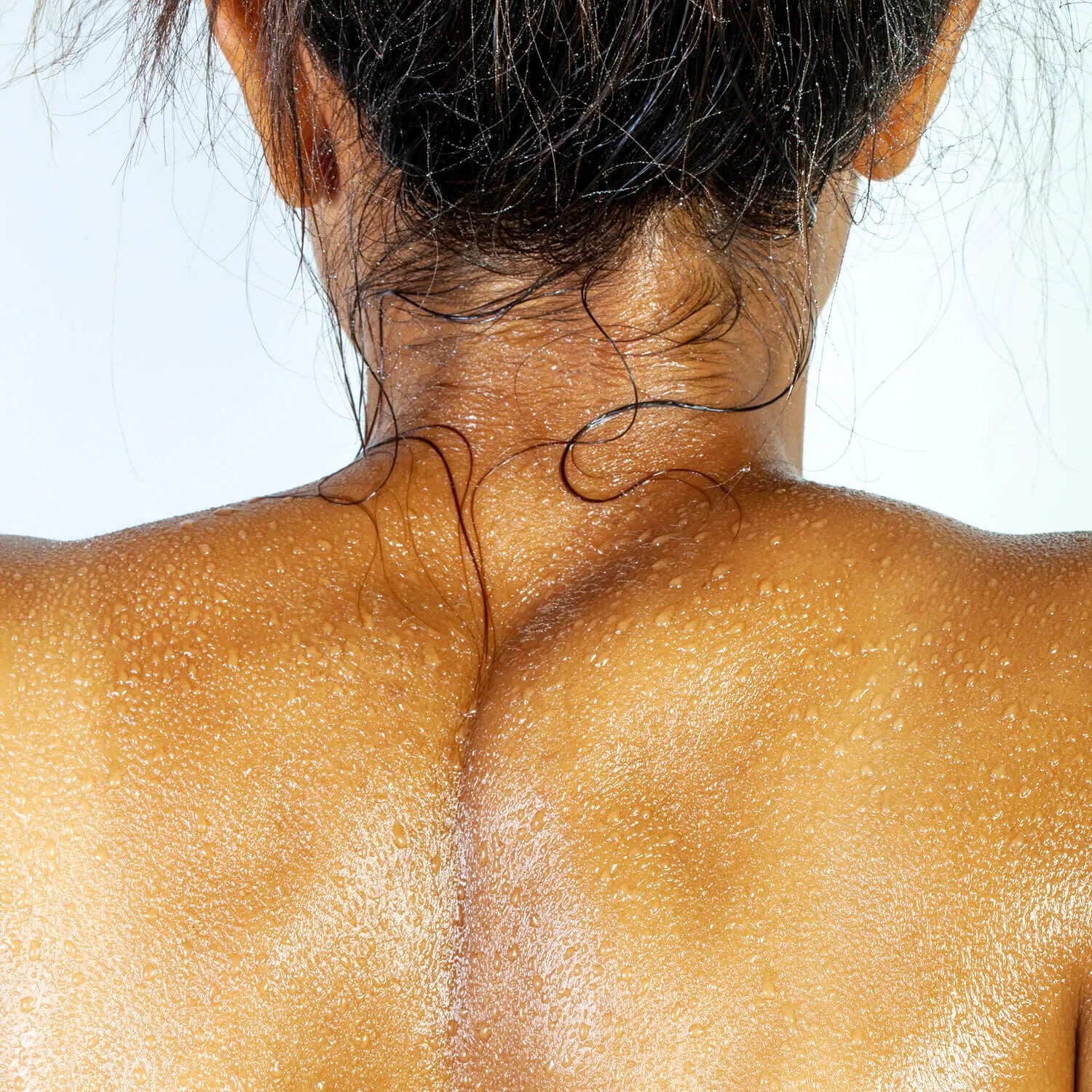
Dry or dehydrated skin – differences and care
It is important to know the differences between dry and dehydrated skin and what the causes are. The different skin types - dry skin as well as oily or combination skin - are largely genetic. Each skin type requires different care strategies with its specific needs. In contrast to dry skin, dehydrated skin is a temporary skin condition that changes over the course of a person's life and that in principle any skin can develop.
How do you know if your skin is dry?
Dry skin feels tight easily, it can be rough, cracked or flaky. The complexion looks pale. Dry skin tends to prematurely form wrinkles, feel tight, feel hypersensitive, red or burn. However, dry skin has at least two visual advantages: the complexion almost always has small pores. And there is no annoying shine in the T-zone either.
To quickly identify dry skin, you can press a paper towel onto your face about an hour after cleansing your face. If your face doesn't leave any greasy marks, you can be pretty sure that your skin is dry.
Causes of dry skin
When skin is dry, the sebaceous glands in the deeper layers of the skin produce too little sebum or lipids. The activity of the sebaceous glands ensures that the skin is supple, elastic and smooth. The skin's own lipids are part of the skin barrier, which protects the skin from moisture loss and drying out.
Dry skin is primarily hereditary, but the changing seasons with their temperature fluctuations and the natural aging process also play a role. Other causes of dry skin that we can influence are smoking, alcohol consumption, medication with its side effects or hormonal fluctuations. Skin diseases such as neurodermatitis or psoriasis also contribute to dry skin. Environmental influences such as dry climates, low humidity due to convection heating, extensive sunbathing, extreme heat or cold wind make dry skin worse, as do aggressive surfactants and emulsifiers in shampoos and creams. Extensive showering or bathing at high temperatures also dries out the skin.
How do you know if your skin is dehydrated?
Dehydrated skin is caused by a lack of moisture. The skin is permanently lacking water. Dehydrated skin manifests itself in a dull, pale complexion, a lack of skin tension, premature lines and wrinkles. Dehydrated skin usually occurs in connection with a weakened skin barrier: the skin cannot retain moisture, but instead loses too much water through the skin's surface. This transepidermal water loss (TEWL) as a skin condition with a weakened skin barrier can occur not only in dry skin, but also in oily or combination skin.
Causes of Dehydrated Skin
In dry as well as dehydrated skin, the protective skin barrier of the upper layer of skin (horny layer) is weakened in its function. As a reminder: The skin barrier is constructed similarly to a brick wall with mortar in between. The horny cells with the connecting skin's own fats from the sebaceous glands as well as water and sweat protect our skin from moisture loss. This so-called hydrolipid film consists of the fatty barrier layer with the acid mantle above it. When the skin barrier is weakened, the moisture from the skin cells evaporates to the outside more.
How does care for dry skin differ from that for dehydrated skin?
While dry skin lacks natural oils, dehydrated skin lacks moisture. Dry skin needs lipids or fats above all, while dehydrated skin needs water. Nourishing plant oils are therefore particularly important as care ingredients for dry skin. In contrast, dehydrated skin benefits from water-based care using facial serums with hydrating hyaluronic acid.
Dry skin especially needs regenerating facial oils and moisturizing facial creams with phospholipids. Plant oils for dry skin are characterized by a specific fatty acid pattern: They contain not only monounsaturated fatty acids such as palmitoleic acid (omega-9), but also polyunsaturated linoleic acid (omega-6) and alpha-linolenic acid (omega-3), which strengthen the skin's protective barrier and promote skin regeneration.
For dehydrated or dehydrated skin, hydrating active ingredients combined with strengthening the skin barrier help. Hydrating active ingredients such as hyaluronic acid, ectoin, betaine or aloe vera provide the skin with deep moisture. Beta-glucan and phosphatidylcholine build up the skin barrier and minimize moisture loss through the skin.
facial cleansing
For dehydrated and dry skin, gentle facial cleansing is essential. We recommend removing makeup or sunscreen with the Deep Cleansing Oil. If you haven't applied makeup or a cream containing sun protection factor, the myrto Cleansing Cream alone is completely sufficient. This soothing care cleanser cleanses your skin ultra-gently with white mineral clay. It does not contain any surfactants, fragrances, alcohol or emulsifiers.
toner
The myrto Magnolia Toner Sensitive without alcohol, fragrances and drying additives soothes skin irritations and redness with chamomile extract and schizandra. Aloe vera and hyaluronic acid provide additional moisture and prepare your skin for the subsequent care steps.
facial serum
The perfect thirst quencher in the fight against dehydrated skin is our hyaluronic serum - a phenomenal beauty booster that every skin type can benefit from. One gram of hyaluronic acid can bind up to a thousand times more moisture. Hyaluronic acid usually occurs in our body as a long-chain compound with a high molecular mass. In facial care, it has proven useful to combine different hyaluronic molecule sizes. In principle, the smaller the molecular mass, the deeper the hyaluronic acid penetrates into the skin and moisturizes the connective tissue. Since ultra-low molecular weight hyaluronic acid with a particularly small molecular size has the best long-term effect compared to the larger molecular sizes, we use this so-called oligo-hyaluronic acid in the highest possible concentration in the Hyaluron Serum 300. You can apply this booster before using your face cream or, if necessary, combine it with another active ingredient serum afterwards.
Moisturizing Face Cream
All myrto organic face creams contain the natural active ingredient beta-glucan as a deep-acting hydrator with long-term effects, which also has an anti-inflammatory effect and strengthens the skin barrier. Another high-performance moisturizing ingredient in all myrto day and night creams is hydrogenated phosphatidylcholine. Vegetable phosphatidylcholine from organic sunflower oil is used in every myrto face cream instead of the usual natural cosmetic emulsifiers made from esterified fatty acids. Phosphatodylcholine is a component of every human cell and a ceramide precursor that is converted into ceramides in the skin. Phosphatodylcholine is completely metabolized in the skin and is able to strengthen and rebuild the lipid-containing skin barrier.
eye serum
In addition to treating more or less pronounced wrinkles, crow's feet or dark circles under the eyes, an eye serum protects the sensitive eye area from drying out and keeps the delicate skin in the eye area elastic. The skin-tightening organic argan eye serum is also rich in vitamins E, C and A. The organic magnolia eye serum counteracts wrinkles, swelling and dark circles under the eyes. The innovative formula with vitamin C, caffeine and 0.5% hyaluronic acid tightens the eye area, refines the skin's appearance and ensures a radiant look.
facial oil
The completely water-free facial oils cannot provide direct moisture, but they supply the skin with valuable lipids and protect against moisture loss by making the skin barrier less permeable. All myrto organic facial oils penetrate the skin completely, quickly and deeply - without sealing it off or leaving the skin feeling greasy. They are a protective shield against dehydration and premature skin aging. In addition to their valuable fatty acids, the myrto facial oils are also packed with antioxidant vitamins, phytosterols, carotenoids and flavonoids, which ward off cell damage and allow inflammation to heal more quickly.
Conclusion
Dry and dehydrated skin require different care approaches because they have different causes. Dry skin lacks natural oils - genetically determined - and tends to feel tight and develop premature wrinkles. It benefits most from nourishing plant oils and moisturizing, emulsifier-free face creams.





